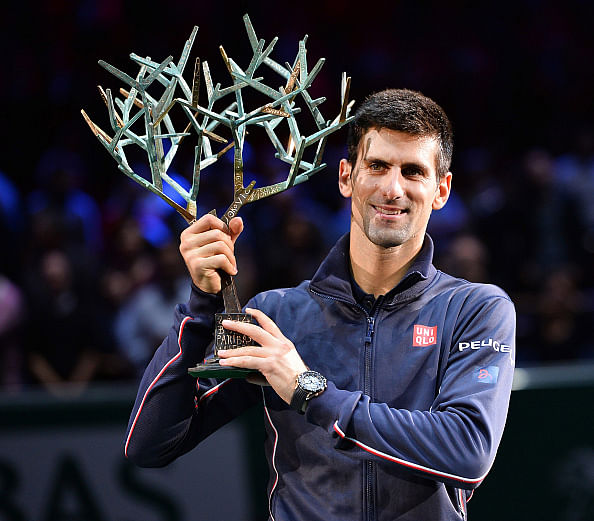
Novak Djokovic's mental edge over his opponents helps him win important matches

Remarkable year for Novak Djokovic
2014 has been a stellar year for World No.1 Novak Djokovic, winning 6 singles titles this year including the Holy Grail of tennis, Wimbledon, claiming his landmark 600th career win and to crown it all off, becoming a father as his wife Jelena Ristic gave birth to their first child, baby boy Stefan last month. His win in the Paris Masters Final makes him only the fifth active player, behind Roger Federer, Rafael Nadal, Lleyton Hewitt and David Ferrer, to win 600 matches. He’s managed to increase his lead over No. 2 Federer to 1,310 ATP points making it almost impossible for the Swiss to overtake him and virtually assuring him the year-end World No. 1 ranking.
In this era of tennis, it's usual to identify a player’s greatest strengths and weaknesses. Nadal has the trademark lasso forehand, whipping up enough topspin to put his opponents on the back foot. Paris Masters runner-up Milos Raonic has arguably the biggest serve on the tour complimented by his ability to compete in long rallies. Andy Murray has one of the best defensive games along with his outstanding quickness and great anticipation.
Federer’s brilliant shot-making and versatility is the stuff of legend. Watching him become the first man to defend his title at the BNP Paribas Masters this week, It’s usual for such questions to pop up, what is Novak’s greatest strength? What is his biggest weapon on court? What separates Novak from so many other talented players on the tour? How did he become the No.1 tennis player in the world?
Mental toughness plays a big part in his wins
The answer was put very eloquently by Novak in his autobiography-cum-cookbook Serve To Win: “The game looks like it takes place between the lines on the court, but really it takes place between your ears.” Novak is famous for defying the odds and winning seemingly lost matches. He has the unique ability to maintain his composure in matches that count. Case in point, the longest Grand Slam Final in history, the 2012 Australian Open Final, which he won, beating Rafael Nadal in a 5 hour 53 minute nerve-wrecker. Nadal is no ordinary adversary, both players pushed their bodies to their limits, it took all the mental reserves Novak had to beat him that day and therein lies his greatest strength, his formidable mental edge.
His amazing comeback against Jo-Wilfried Tsonga at the 2012 French Open is another perfect example. His 2014 Wimbledon title was also a hard fought victory, with both him and Federer tied at two sets apiece, it was the Serb’s superior mental strength that day that finally won him the match, as he later said himself, “I could easily have lost my concentration in the fifth set and handed him the win, but I didn’t. That’s why this win was so important to me mentally.”
Novak himself says,“There’s not much difference between the No. 78 player in the world and Nos. 2,3,1,5”. In the end, it all comes down to this, that elusive mental strength and composure, Its not the amazing forehand or the huge serve, but the mental toughness to come back from that double match point and seal the deal, and Novak has spent as much time developing this ability as he has practicing those sublime groundstrokes.
Boris Becker has played an important role this year
There’s no instantly recognisable feature in his game that separates him from the rest of the top 10. He’s always playing the balls off his feet. His body is extremely flexible, allowing him to hit some amazing passing shots and he is as comfortable playing on the net as he is on the baseline. It's an all-round game which many of his contemporaries also have. The cherry on top however, is the mental edge.
He appointed Boris Becker as his coach along with Marian Vajda this year to further develop this very aspect of his otherwise complete game. As he says himself, "That's one of the reasons Boris is here, because of the big matches and Grand Slams. I felt I dropped two or three titles in the last two years I could have won. I felt there was a mental edge I was lacking."
Djokovic, having won the Australian Open title on each of his three previous visits to Melbourne Park, was dethroned by eventual winner Stan Wawrinka 9-7 in the fifth set of their quarterfinal this year. Becker believes the defeat to Wawrinka allowed them time to assess which way they needed to go, and allowed him to begin to influence the Serbian's game, especially the mental side, which is evidently paying back rich dividends as Novak is on track to retain the World No.1 title this season.